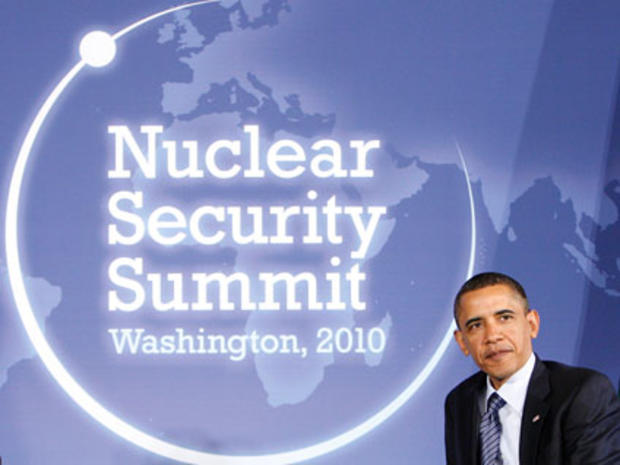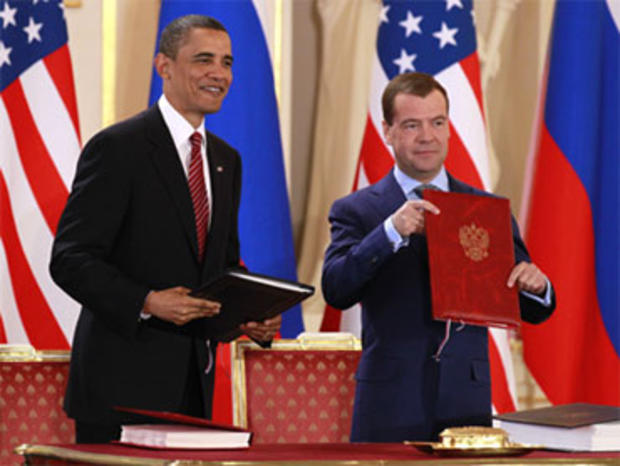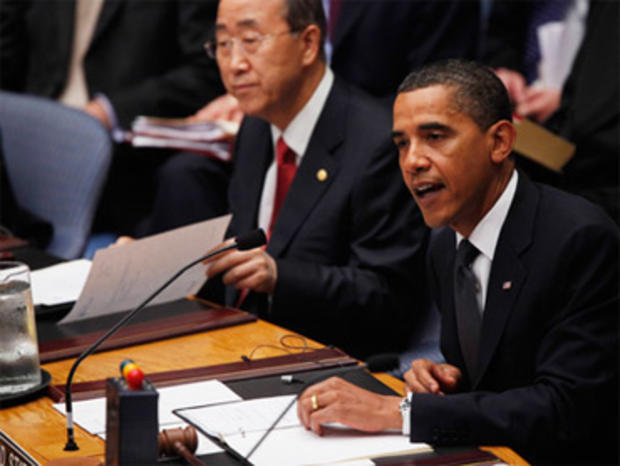Obama Seeks Legacy on Reducing World's Nuclear Weapons
President Obama was the first U.S. president to preside over a U.N. Security Council on non-proliferation of nuclear weapons this past September, and this week, he is running the largest international summit meeting hosted by a U.S. President since World War II.
The nuclear summit this week is a prelude to both the Senate ratification of the U.S.-Russia Treaty and the Nuclear Non-Proliferation Treaty conference next month at the U.N., at which he is hoping to get support for sanctions -- with teeth -- against Iran.
The ominous question remains: will non-proliferation between nuclear nations prevent the sale or use by terrorist groups such as al Qaeda, the development of a weapons program by Iran, or the development of delivery systems in North Korea for the nuclear weapons they already have?
List of World Leaders Attending the Summit
The answer may be found in the bigger picture. After a year of intense negotiations, Mr. Obama and Russian President Dmitry Medvedev last week signed a strategic arms reduction treaty that is designed to reduce the number of long-range deployed nuclear warheads by thirty percent and, although the U.S.-Russia Treaty has to pass a partisan Senate by 67 votes, it is clearly a legacy issue for the Obama Administration.
For the Obama Administration, reduction of nuclear weapons is an important issue and one which the president has made a point of pursuing in different places to set the tone for support: he introduced the Resolution at the United Nations Security Council in September; in Prague last week, he signed the treaty with Russia; he announced a policy review putting limits on U.S. use of nuclear weapons; and this week, he hosts a Global Nuclear Security Summit Washington.
The arms reduction treaty signed by Mr. Obama will need Republicans in the Senate to approve it and critics have been lining up, saying that the treaties make U.S. defense look weak. The administration has built in wiggle room on development of weapons to satisfy some critics and, although it will take some time to pass, it is clear that the treaty improves U.S.-Russian relations and will have strong backing from the president himself.
Critics say that the U.S. nuclear arsenal should be modernized and that the administration's "no first-strike (with exceptions), no new warheads" makes America look weak. Already speaking out against it are Connecticut Sen. Joe Lieberman (I), who doubts the U.S.-Russia Treaty has the votes to pass the Senate and Republican Sen. Lamar Alexander of Tennessee who says not this year.
Mr. Obama was blasted in New Orleans this week by Newt Gingrich and by Sarah Palin.
Republicans Sens. John McCain and Jon Kyl took issue with the new U.S. nuclear strategy, the "Nuclear Posture Review," saying that the president must clarify what options he is taking off the table.
But unlike the health care debate and the economy overall, the Obama Administration is following a long line of Republican presidents and it has lined up international backing and some bipartisan support for his anti-nuke focus.
In September, the U.N. Security Council pledged its unanimous backing for progress on stalled efforts to stop the proliferation of nuclear weapons and reduce existing weapons stockpiles, as well as to control fissile material.
In tow with Mr. Obama at the U.N., sitting in the Council chamber in September, were none other than George Shultz, Bill Perry, Henry Kissinger, and Sam Nunn. And who did Mr. Obama quote for guidance? Ronald Reagan.
At the U.N., Obama quoted former President Reagan saying, "A nuclear war cannot be won and must never be fought. And no matter how great the obstacles may seem, we must never stop our efforts to reduce the weapons of war...we must never stop at all until we see the day when nuclear arms have been banished from the face of the Earth."
The Reykjavik summit meeting between Ronald Reagan and Mikhail Gorbachev on October 11-12, 1986 is, in retrospect, seen as an achievement for the Reagan administration.
Last July, before the Senate became definitively partisan because of domestic programs, McCain called for a nuclear-free world during a speech on the Senate floor to mark the unveiling of a statue of Reagan in the Capitol.
And, for Mr. Obama, the interest in setting policy on nuclear issues goes back a long way. In a 1983 college essay on non proliferation, posted on a Columbia University website, he wrote that one of the problems with the American experience "elaborate patterns of knowledge and theory have been disembodied from individual choices and government policy."
So, for the president, this is his chance to move the ball forward. He is predicting the end of the year for Senate ratification of the U.S.-Russia Treaty.
Mr. Obama will continue to make the case that there still is enough destructive power in the nuclear arsenal of the U.S. to respond to threats and the administration is hoping that history is on his side.
"There is a strong history of bipartisanship when it comes to the evaluation of international treaties, particularly arms control treaties," he said.
At the heart of the overall new nuclear policy -- the U.S. nuclear strategy, the U.S.-Russia Treaty, the summit and follow-up meetings -- is the threat to U.S. and international security. Mr. Obama is banking on a new multilateralism to stem the flow of money and technology to Iran, North Korea and to terrorists.
Next month, the U.N. takes the steering wheel back for an international disarmament conference designed to strengthen the Nuclear Non-Proliferation Treaty. None of the policies, individually, will stop the threat that nuclear weapons present today, but the theory is that by circling the international wagons around rogue states and terror groups, the U.S. has a better shot that technology and financing will not land in the hands of terror groups and dangerously-rogue states.
More Coverage of the Summit:
Obama's Nuclear Summit to Focus on Terror Threat
Washington Readies for Huge Nuclear Summit
This story was filed by CBS News foreign affairs analyst Pamela Falk, based at United Nations Headquarters in New York.



